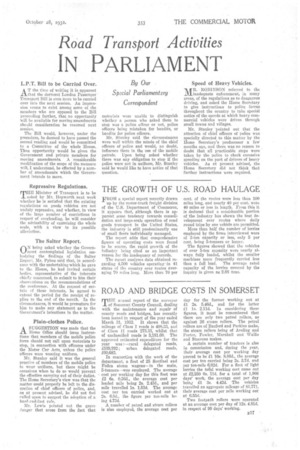Road Transport Activities
Page 43

If you've noticed an error in this article please click here to report it so we can fix it.
IN PARLIAMENT
By Our Special Parliamentgry Correspondent
L.P.T. Bill to be Carried Over.
AT the time of writing it is apparent that the dormant London Passenger Transport Bill is once more to be carried over into the next session. An impression seems to exist among some of the members who are opposed to the Bill proceeding farther, that no opportunity will be available for moving amendments should consideration be resumed next sessi o»,
The Bill would, however, under the procedure, be deemed to have passed the second reading and would he committed to a Committee of the whole House. Thus opportunity would be given the Government and private members for moving amendments. A considerable modification of the scope of the measure will, I understand, be effected by a number of amendments which the Government intends to move.
Repressive Regulations.
TEE Minister of Transport is to be asked by Mr. Hepworth .next week whether he is satisfied that the existing regulations on goods vehicles are not unduly repressive, and whether, in view of the large number of convictions in respect of overloading, lie will consider the advisability of examining the whole scale, with a view to its possible
The Salter Report.
OO being asked whether the Government contemplated legislation embodying the findings of the Salter Repori7, Mr. Pybus said that, in accordance with the undertaking which he gave to the House, he had invited certain bodies, representative of the interests chiefly concerned, to submit to him their observations on the recommendations of the conference. At the .request of certain of these interests, he agreed to extend the period for the receipt of replies to the end of the month. In the circumstances, it wonld be premature for him to make any statement as to the Government's intentions in the matter.
Plain-clothes Police.
ASUGGESTION was made that the Borne Office should issue instructions that members of the mobile police force should not call upon motorists to stop, in connection with offences under the Motor Car Acts, unless the police officers were wearing uniform. Mr. Stanley said it was the general practice of members of the mobile police to -wear uniform, but there might be occasions when to do SO would prevent the effective carrying out of their duties. The Home Secretary's view was that the matter could properly be left to the discretion of chief officers of police, and, as at present advised, he did not feel called upon to suggest the adoption of a bard-and-fast rule.'
Mr. Lewis pointed out the grave danger that arose from the fact that motorists were unable to distinguish whether a person who asked them to stop was a police officer or not, police officers being mistaken for bandits, or bandits for police officers.
Mr. Stanley said the circumstances were well within the minds of the chief officers of police and would, no doubt, influence them in the use of the mobile Patrols. Upon being asked whether there was any obligation to stop if the police were not in uniform, Mr. Stanley said he would like to have notice of that question.
Speed of Heavy Vehicles.
/001-R. ROBINSON referred to the 11.1 Inadequate enforcement, in many areas, of the regulations as to dangerous driving, and asked the Home Secretary to give instructions to police forces throughout the country to take special notice of the speeds at which heavy commercial vehicles were driven through small towns and villages.
Mr. Stanley " pointed out that the attention of chief officers of police was specially directed to this matter by the Home Secretary's predecessor a few months ago, and there was DO reason to doubt that all practicable steps were taken by the police to check excessive speeding on the part of drivers of heavy vehicles. As at present advised, the
• Rome Secretary did not think that further instructions were required.






































































































